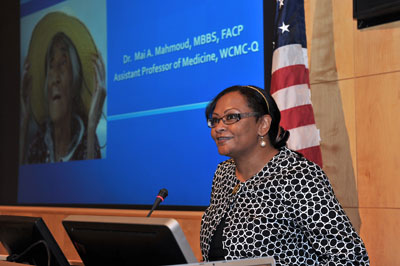Special Health Considerations for Older Adults
WCMC-Q physician discusses health and aging at Medicine & U Lecture November 23, 2010

Physicians caring for older adults should be aware of the different ways
disease presents itself in aging individuals, says WCMC-Q Assistant
Professor of Medicine Dr. Mai Mahmoud.
More and more people are living well beyond age 65, thanks to advances in public health, medicine and economic development. Even as people live longer and healthier lives, physicians should be aware of special health considerations in older adults, according to Dr. Mai Mahmoud, who discussed the topic of health and aging Tuesday at a Medicine and U Lecture at Weill Cornell Medical College in Qatar.
“In the absence of disease, the natural decline in physiological reserves that accompanies age causes no symptoms and has little effect on the activities of daily living,” says Dr. Mahmoud. “Most older adults are able to continue functioning unless they develop acute illness. Before attributing any change in their functioning to aging, serious diseases should be investigated.”
Disease may present differently in older people than in younger people, adds Dr. Mahmoud. For example, an older person suffering from infection may not have fever. Older persons with angina may take to their beds rather than complain about chest pain or discomfort. In general, older people present with decline in function, falls, incontinence and confusion, regardless of the underlying disease. Additionally, older adults may suffer from complications of mild diseases.
Physicians caring for older adults should be aware of the different ways disease presents itself in aging individuals. Called “geriatric giants,” they include dementia, delirium depression, instability or falls, incontinence, constipation, and weight loss. “Physicians should screen patients for these problems because early intervention can improve the patient’s quality of life and, in some cases, prevent complications,” says Dr. Mahmoud.
Another consideration for older adults is medications. “We try to make the drug regimen as simple as possible, and we start with half the recommended dose and increase it slowly as tolerated,” says Dr. Mahmoud. “Patients should bring all their medications to each doctor visit for review. Elderly patients may see different doctors for different reasons and could end up taking two medications from the same class if physicians are not aware of all their prescriptions.”
“To age in a healthy manner, people should maintain a healthy lifestyle, control chronic diseases such as high blood pressure and diabetes, stay active, and maintain a positive attitude,” says Dr. Mahmoud.
In Qatar and the rest of the Arab world, the elderly enjoy high stature and authority, says Dr. Mahmoud. Even though Qatar is classified as a developing country, the average life expectancy is age 74 for males and age 76 for females. “That is a good indication of the country’s excellent health care and its regard for the elderly,” says Dr. Mahmoud.
By Kristina Goodnough
Read this release in Arabic
